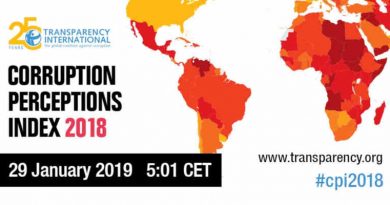Corruption Costs Kenya 300,000 Jobs Every Year

Corruption is such a strong impediment to development and democracy that the African Union declared 2018 as the African Anti-Corruption Year, with the aim to spread awareness about the effects of corruption and to strengthen those combating it.
With almost half of its population currently under the age of 25, and three-quarters under the age of 35, Africa is the youngest of all continents. It is clear that challenges such as socio-economic inequalities, social exclusion and unemployment, besides being risk factors for crime and corruption, prevent youth from reaching their full potential.
[ The Integrity Bulletin Launched to Cover Corruption Issues ]
To keep the dialogue open with this most important of resources, its young people, UNODC’s Regional Office for Eastern Africa, with support from the Global Programme for the Implementation of the Doha Declaration, organized last week the National Youth Workshop on Promoting Good Governance and Integrity.
With the participation of some 500 Kenyan youth, representing all segments of society, including vulnerable communities from across the country, these young voices joined important stakeholders from the office of the President of Kenya, Government ministries, parliamentarians, the judiciary, academia, and the private sector.
[ Appropriate Legal System Needed to Combat Corruption: Ulla Tørnæs ]
Describing the Government of Kenya’s aspirations on the matter and its efforts to fight corruption in line with the Kenya Vision 2030 development programme, Elizabeth Mueni Kimulu, Director of Youth and Social Affairs Director in the Office of the President, stressed the necessity of a continuous dialogue with youth – as well as the tangible impact on people’s opportunities. “Corruption costs Kenya some 300,000 jobs every year,” she informed an amazed audience.
This inter-generational dialogue tackled the role of youth and educators in countering crime and corruption.
Photo: UNODC






